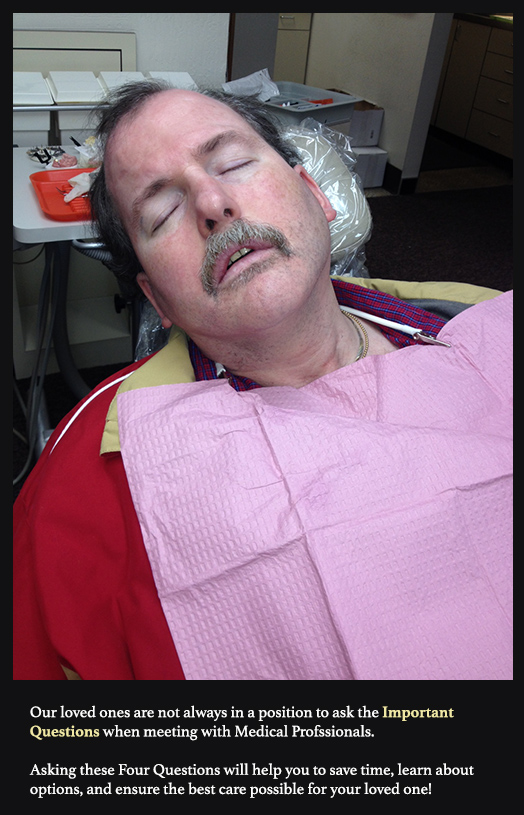The Four Most Important Questions for Caregivers To Ask Medical Professionals

By Trish Hughes Kreis for Assisted Living Directory
Caregivers advocate for their loved ones on a daily basis and much of that advocacy comes in the form of asking questions. While some of advocacy is relentless persistence in pursuing a needed treatment or program or care, advocacy often starts with a question.
Four questions continue to be the basis for many different caregiving situations and can lead to the best care for your loved one.

Keeping these questions in mind and using them as a mantra when caregiving can also give the caregiver peace of mind that they have done their best to advocate for the best care possible for their loved one.
Question 1: Are there any other options? Medical professionals (doctors, dentists, care providers) will often present a solution to a particular problem. One solution – just one. In fact, it often sounds as if it is the only solution making it seem impossible to make an informed decision. Asking the simple question “Are there any other options?” often times leads to a simpler solution or at least will lead to a deeper discussion about the option presented.
As an example, my brother was having a gum issue and the solution presented was a skin graft. It seemed complicated and expensive but was presented in a way that made it seem as if that was the only option. However, asking “Are there any other options?” led the dentist to say he could pull the tooth causing the gum issue and further informed me that the tooth was problematic would probably have to be pulled eventually anyway, even after the skin graft. Pulling the tooth meant the gum would heal itself and the skin graft was not needed. This alternative option was the best one for us since caring for a skin graft would have been difficult for my disabled brother.
Question 2: What else can I do? This question can be used when it seems there are no good options. It can also be used when the doctor or nurse is listing ways to handle a particular issue. It is amazing how much more information a caregiver can get when getting the doctor or nurse to go “off script.” This also gives them a reminder that you, in fact, are an active part of the care solution.
For instance, my brother is prone to pneumonia but we want to do everything possible to keep him out of the hospital since there is such a decline after a hospital stay. Working with my brother’s pulmonologist, we have decided it is best to do everything possible to keep him home during his bouts of respiratory illness. The nurse practitioner gave me lots of tips to manage his care at home but I always got a few more extra tips when I asked “What else can I do?” Using these tips we have managed to keep him out of the hospital during his last two bouts of respiratory illness!
Question 3: Do we need a specialist (or another doctor)? This is a great question to ask of not only the primary care doctor but also in the emergency room. The emergency room doctors are wonderful at working toward identifying and solving the acute issue but may not know the history, big picture or other (seemingly) unrelated, chronic issues. The caregiver can give the ER doctors all this information but may also have to ask for the specialist to be consulted.
For example, if your loved one already has a specialist (neurologist, pulmonologist, etc.), it might be necessary to ask the ER personnel to see those specialists earlier in the ER stay than later. Also, if the primary doctor is not solving a persistent problem in your loved one, it is time to ask for a referral to a specialist. Do not worry about hurting the doctor’s feelings – they understand their limits and are usually in agreement that a specialist is needed.
Question 4: Is it time for hospice care? No one likes to think this is a question that will need to be asked but we often have to do so. Hospice provides a whole new level of care to both the caregiver and their loved one. There are some misconceptions about hospice so be sure to ask follow-up questions about it.For instance, one caregiver was told dialysis was not allowed when the patient is in hospice care. This was untrue and, while a bit more complicated to describe in detail here, once her husband was on hospice, he was able to continue his dialysis. It does not hurt to ask the question “Is it time for hospice care?” and then follow that up with “what will that involve?”
There are plenty more questions that caregivers can ask while caring for their loved one but these four are staples for any caregiver. Remember that advocacy is the caregiver’s constant companion and questions are the arsenal for that companion. Good luck!



Nice summary Trish. We find #4 to be the hardest for families to cope with.